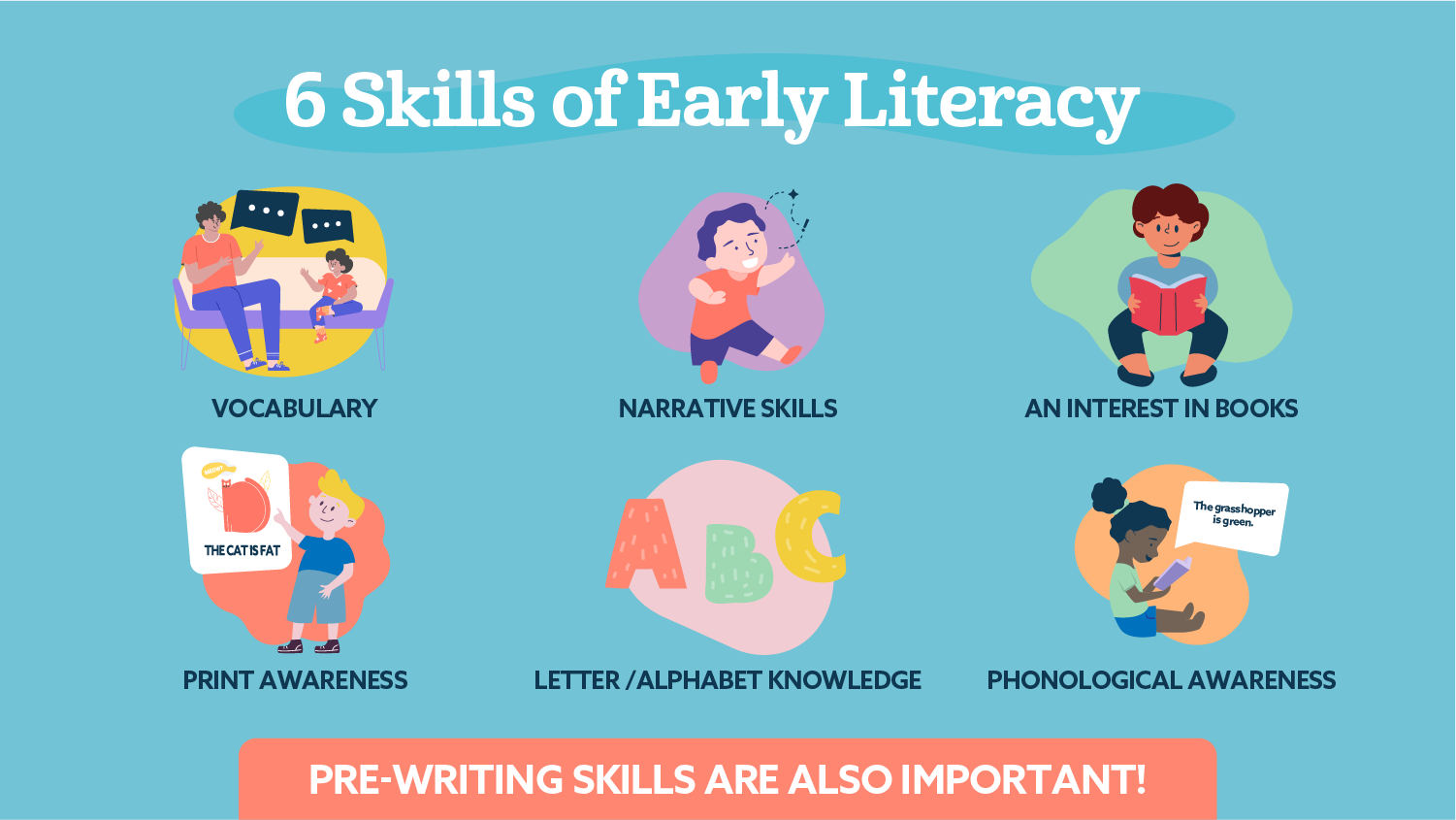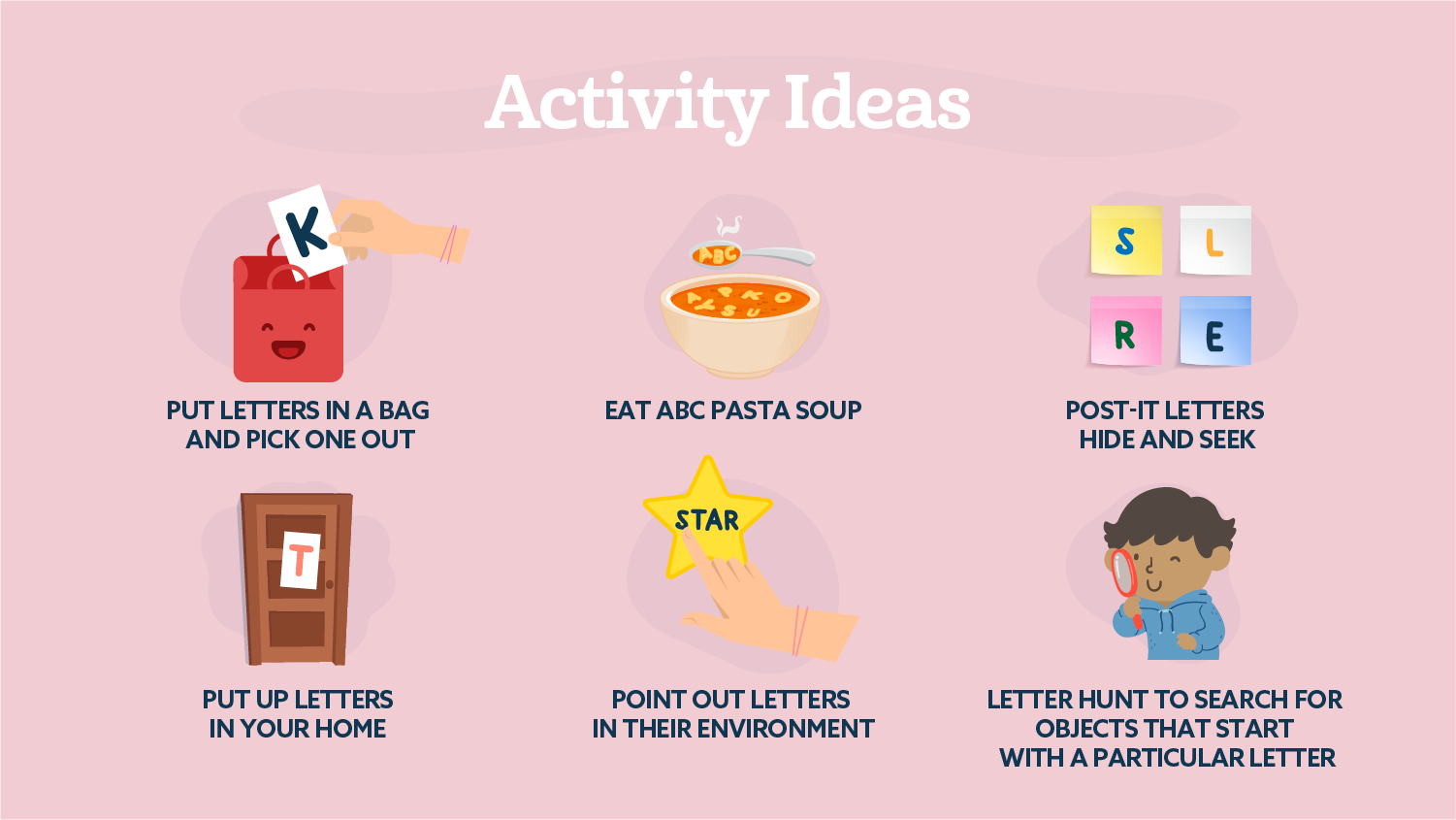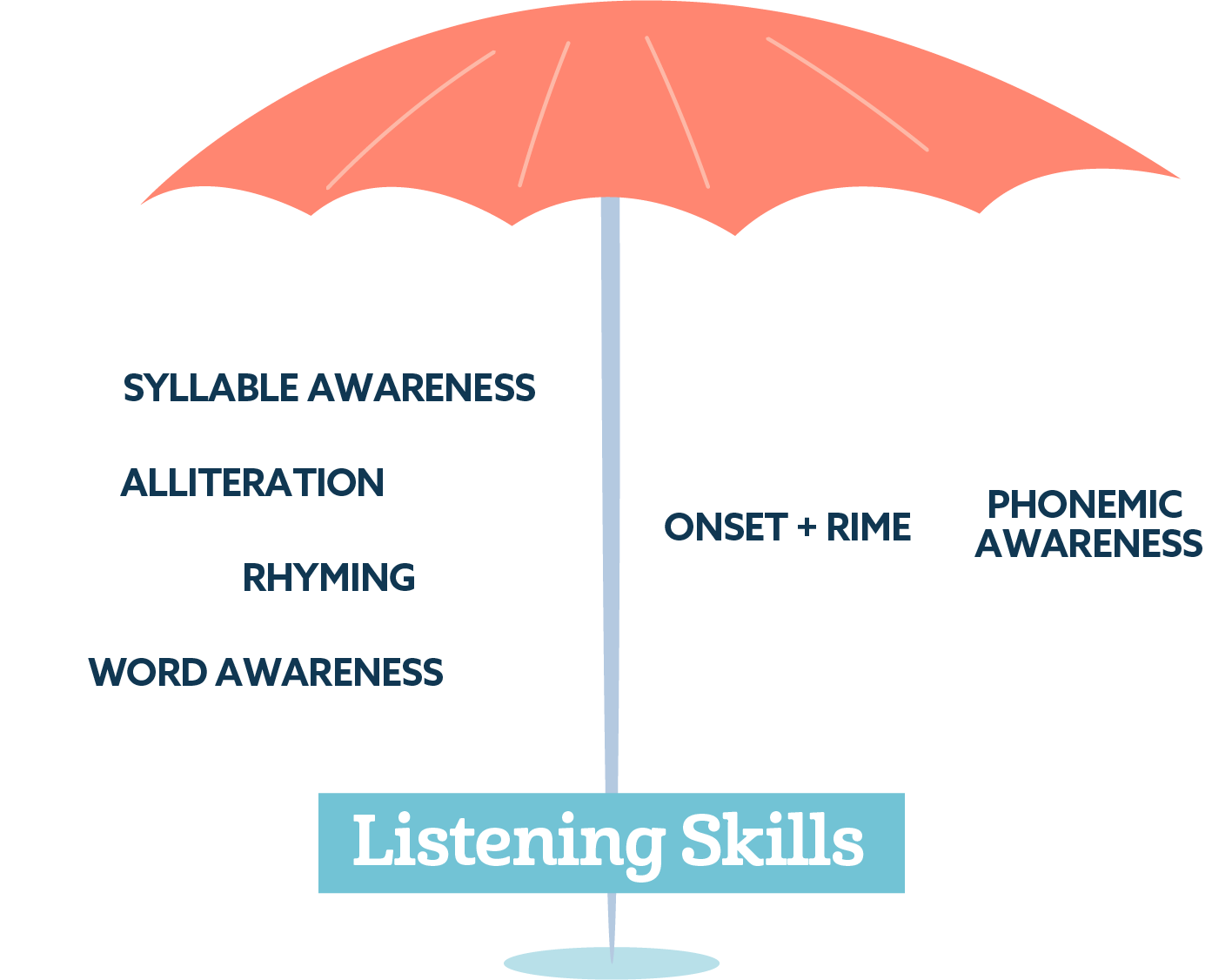Early Literacy Skills to Set Your Child Up for Reading Success
Posted: Friday, 13 August 2021
There’s a lot of information out there about the best way to teach your child to read. As a parent, it can be overwhelming!
- Should I use flashcards?
- When should my child start to read on their own?
- What letters do I teach first?
- When should I seek help?
Let’s peel back the layers and start at the very beginning-early literacy. Early literacy refers to all the skills your child needs to know before they read and write. Early literacy does NOT mean reading early.
Your child doesn’t just wake up one day and decide, hmmmm I think I’ll start to read today. Early literacy starts at birth just like learning language. It’s a process. A marathon, not a sprint. Learning these early skills will make it easier for your child (and for you) to learn how to read later on. Little by little your child picks up a variety of skills as they talk, listen, play, read and explore their environment with you. It’s easier than you may think.
Learning should be fun, engaging, interactive, and it should feel like play. If you’re having fun with it, chances are so is your child. Not sure where to start? Ask yourself this: What interests does my toddler or preschooler have? What gets them excited? Start there.
When you introduce a new skill to your child, think of: SHOW, TELL, DO.
- Show them how to do it first
- Tell them how to do it and do it together
- Let them do it themselves
Let’s cut the noise and get to the nitty gritty of what these skills look like so you can set your child up for reading success with little effort right at home!

#1 Boost Your Toddler and Preschooler’s Vocabulary
The most foundational skill to reading is language and more specifically, vocabulary, or knowing a whole bunch of words and what they mean. Isn’t it neat how all the time you spend teaching your child to communicate, you are also building their foundation to read! Good job mama (or dad)!
Why is vocabulary so important?
It’s much easier for your child to read a word when it’s a word they already know. Children with larger vocabularies have an easier time when they start to read because they can make sense of what they’re sounding out right away rather than trying to sound out a word and learn the meaning of a new word at the same time. That’s a lot of extra work.
Language also includes listening skills. Your child has to be able to listen to the sounds of different words and combinations of words to understand language and follow directions.
How can you boost vocabulary?
- Go for a walk and talk about what you see and hear
- Talk about similarities and difference of objects
- Write out and talk about grocery lists
- Follow a recipe and talk about the ingredients
- Talk about the different items of clothing in the laundry basket
- Read books and talk about the pictures
- Talk about what words mean and relate it back to your child’s life
- Respond to your child when they are interested in something and talk about it
- Have conversations with your child during mealtime
- Use a variety of words (nouns, verbs, adjectives, synonyms, etc)
#2 Nurture Your Child’s Inner Storyteller
Narrative skills can include describing events, telling stories, knowing the sequence of events and making guesses. When your child can describe something or retell a story that you just read to them, it shows that they’re understanding. Understanding a book is crucial when helping your child stay motivated to keep reading. Imagine reading something but having no idea what it means. Would you want to continue reading? Probably not.
How can you encourage this skill?
- Have conversations about your day
- Take turns adding a line to build a story
- Read wordless books and make up your own stories
- Talk about the characters, events and endings of a book
- Ask questions about what you think will happen in a book
- Have your child tell you a story
- Have your child tell you about their favourite game or activity
#3 Expose, Excite and Explore Books
Does your toddler enjoy exploring books on their own? Looking at books with you? Flipping through pages of a book?
Print motivation is exactly what it sounds like-being motivated and interested in books. This is a skill that develops fairly early on.
Why is this early literacy skill so important?
Children who enjoy books will be curious and motivated to learn to read for themselves when they grow up!
How can you encourage this skill?
- Have books around the house, create your own library or go to the library
- Bring books everywhere you go (e.g., in the car, at the park, in the stroller)
- Let your child explore books and follow their lead
- Read to your child right from day one day
- Let your child see you reading
- Create fun associations with books by keeping reading positive
The moment reading is not fun, hit the breaks. Take the pressure off you and your child! It’s not about length during these early years but rather quality. As your child grows, so will their attention span to read a book with you. A few minutes of positive reading time is better than 20 minutes if they’re not interested.
#4 Point Out Print
Words and letters are everywhere! By pointing out words and letters in your child’s environment, you’re helping your child recognize letters and concepts of print, help them to eventually write, read, spell and comprehend what they read. Print awareness is the fourth early literacy skill and it is knowing how books work and being able to notice print and words.
Print awareness can include knowing:
- That there is a front and back cover of a book
- How to hold a book upright
- How to turn the pages correctly
- That we read from left to right and top to bottom
- That the letters on the page make up words and the words make up sentences
- That we have uppercase and lowercase letters
- That print carries meaning
Simply by reading books to your child, you’re exposing your child to print and the mechanics of a book. An easy way to see if your child is learning this skill is to hold a book upside down and see if your child notices.
How can you encourage this skill?
- Point out print in your environment, in books or wherever you see print
- Talk about the differences in letters (e.g., this one is round, this one is pointy)
- Point out the title, author and illustrator of the book
- Let your child turn the page and explore books
- Point out punctuation (e.g., exclamation marks, questions marks)
- Track words with your finger while you read
- Talk about spaces in between words
- Point out print on cereal boxes, street signs, tags on clothes, letters in the bathtub
When your little one is first learning words, focus on functional words to get their wants and needs met. Words such as up, mama, eat, help, more, go rather than teaching colours, letters, numbers, shapes. Letters are important and they will come. But at the beginning of learning words, focus on those functional words first.
#5 All About Letters
Letter knowledge is knowing and recognizing the letters, knowing that letters look different, knowing that letters have names and sounds.
Around age two, children start to develop symbolic thought, meaning that one thing can represent something else-like how letters are symbols. Some toddlers show an interest in letters early on, while others don’t have any interest until kindergarten. Both are okay! Don’t push it if your child is not interested.
Key ideas when teaching letters:
- There’s no rush
- Keep it positive
- Repeat, repeat, repeat
- Start with the letters in your child’s name
The biggest takeaway is to make learning multisensory. This doesn’t mean pulling out a sensory bin every time you’re learning letters. Multisensory just means using more than one sense-hearing, seeing, touching, moving. Multisensory learning increases memory and retention and it’s just really a lot of fun and engaging for your child.

How can you encourage this skill?
- Put letters in a bag, pick one out and say the name and sound
- Write letters on Post-it notes and hide them around your house
- Put up letters in your home (e.g., “B” for bedroom, “K” for kitchen)
- Do a letter hunt around your house and search for letters or objects that start with a certain letter
- Trace letters in sand, shaving cream, rice, foam, on carpet, sandpaper, glitter paper
- Sort letters by how they look
- Make sound/letter baskets with objects of the same letter in each basket
- Get your child moving: arms crossed for the letter “X”, tap their foot for the letter “T”, pretend to lick an ice cream for the letter “L”
#6 Have Fun with Sounds
Phonological awareness are big fancy words that basically mean hearing, thinking, playing and moving around sounds, syllables and words of spoken language. These skills are foundational for reading and writing and often develop when your child is learning letters. You can build these skills with your eyes closed!
These skills are so important that they can predict long term reading and spelling success even better than intelligence, vocabulary and socioeconomic status!
Have fun here. This is not a time to pull out flashcards. Embed learning into play and in your everyday routines, and repeat, repeat, repeat. A little bit every day will add up.
Even before these skills develop, your child’s listening skills are important. You can prime your toddler’s brain to hear differences in sounds just by going for a walk! Point out when you hear a dog bark, a car beep or a bird chirp.
Some of these early developing skills such as being aware of rhymes can start to develop around age two, while other skills develop in preschool and kindergarten. And learning doesn’t just stop there. These skills continue to develop even after your child starts to read and will make your child a stronger reader.
So let’s break it down and give you examples of how to encourage these skills easily at home.
Early developing skills:
- Rhyming
- Alliteration (a series of words that have the same beginning sound)
- Word awareness
- Syllable awareness
How can you encourage this skill?
- Say words that rhyme with your child’s name, family member names, pet names
- Say two words and see if your child can identify if they sound the same or different
- Sing songs that rhyme
- Play, “I hear with my little ear, something that rhymes with…”
- Say tongue twisters
- Sound stories: Say a word and have your child think of a word that starts with the same sound
- Read books and point out words that have the same beginning sound
- Count out syllables or words by clapping, jumping, using blocks, stickers, pom poms, or cheerios
- Say a word and break it apart like “book” “shelf” and tell your child to smush them together “bookshelf”
- Give your child a word like “baseball” and tell them to break it apart “base” and “ball”
Later developing skills:
Onset + rime: first sound in a word (rime) and the last sound in a word (onset). For example, in the word “cat”, “c” is rime and “at” is the onset.
Phonemic awareness: identifying and playing with individual sounds in spoken language.
How can you encourage these skills?
- Say the end of a word like “at” and have your child come up with the first sound to make up different words like mat, cat, chat, hat, fat, pat
- Ask your child to tell you the first sound in “mat”
- Ask your child to tell you the last sound in “mat”
- Ask your child to say the word “cat” without saying “c” (“at”)
- Ask your child to smush these sounds together /m/ /e/ (“me”)
- Ask your child to break these sounds apart “in” ( /i/ /n/)

There you have it it! Early literacy skills you’ll need to set your baby, toddler or preschooler up for reading success. Since spelling goes hand-in-hand with reading, pre-writing skills are important too! You can encourage your child’s pre-writing skills by letting them scribble, paint, play with playdough, thread beads, use scissors and draw shapes.
If you want even more information on early literacy, check out The National Reading Panel’s article here.
Building up your child’s vocabulary, along with talking about print you see in their environment are some of the best ways to lay the foundation for a successful reader. Learning about letters names and sounds and being able to play around with sounds will become handy when your child starts to read words. Read books with your child and have your child tell you stories.
What you put in at the beginning, you will get tenfold later on. Learning should be fun, interactive and in small doses. The goal is a love of reading, NOT to read early!
Like what you read and want more language and literacy tips and info? Sign up to now to Chatterbox Family’s first ever online course launching Fall 2021 for parents with little ones aged 0-5!
This course is all about laying the foundations for language and early literacy using one tool and one tool only: books! It’ll take you from overwhelmed trying to figure out ALL the things, to empowered in supporting your little one right at home! Discount code and freebie included after you sign up!
More PostsLike and Share
Author: Elaina Mansourian, M.Cl.Sc. Reg. CASLPO
About: Speech-language pathologist, mom of two little ones and creator of Chatterbox Family.

